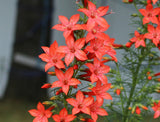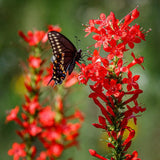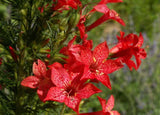500 Gilia Red Standing Cypress Flower Seeds Ipomopsis rubra
Gilia Red Standing Cypress Flower Seeds Ipomopsis rubra,
A sturdy, upright perennial variety native to the southeastern portion of the United States. The brilliant red, tubular flowers are marginally spaced throughout the entire length of the spike. The leaves are finely divided making this variety easy to identify when not in bloom. Requires a very dry, well drained soil in full sun to partial shade.
Recommended to be seeded in the fall for this eastern North America native biennial. Plants grow in full to partial sun, with dry to moderate moisture. Trumpet-shaped flowers in shades of scarlet, rose or pale pink produced from mid to late summer provide an important nectar source for hummingbirds (Ruby-throated), which also pollinate the plant.
Suggested use: Borders along fence lines, meadows, mass plantings.
Miscellaneous: An excellent variety to attract hummingbirds and butterflies to the garden. Drought tolerant once it becomes established.
Color: Red
Bloom Period: Summer (June - August)
Height: 36"-72"
Germination: 14 - 30 days
Optimum Soil Temp. for Germination: 65°F - 68°F
Sowing Depth: 1/16"
Sowing: Direct sow in fall, sowing just below the surface of the soil. For spring planting, start the seed indoors 6-8 weeks before the last frost; plant just below the surface of a flat in soil mixed with a high percentage of sand.
Keep the soil temperature at 65-70 degrees F; germination should occur within 15-30 days. Transplant the seedlings when the soil has warmed; plant them as soon as possible, since they soon form a long tap root that does not appreciate being disturbed.
Planting them in clusters will provide support for the developing stalks. Seedlings can also be started in late summer and transplanted in late fall for summer blooming in the next year.
A sturdy, upright perennial variety native to the southeastern portion of the United States. The brilliant red, tubular flowers are marginally spaced throughout the entire length of the spike. The leaves are finely divided making this variety easy to identify when not in bloom. Requires a very dry, well drained soil in full sun to partial shade.
Recommended to be seeded in the fall for this eastern North America native biennial. Plants grow in full to partial sun, with dry to moderate moisture. Trumpet-shaped flowers in shades of scarlet, rose or pale pink produced from mid to late summer provide an important nectar source for hummingbirds (Ruby-throated), which also pollinate the plant.
Suggested use: Borders along fence lines, meadows, mass plantings.
Miscellaneous: An excellent variety to attract hummingbirds and butterflies to the garden. Drought tolerant once it becomes established.
Color: Red
Bloom Period: Summer (June - August)
Height: 36"-72"
Germination: 14 - 30 days
Optimum Soil Temp. for Germination: 65°F - 68°F
Sowing Depth: 1/16"
Sowing: Direct sow in fall, sowing just below the surface of the soil. For spring planting, start the seed indoors 6-8 weeks before the last frost; plant just below the surface of a flat in soil mixed with a high percentage of sand.
Keep the soil temperature at 65-70 degrees F; germination should occur within 15-30 days. Transplant the seedlings when the soil has warmed; plant them as soon as possible, since they soon form a long tap root that does not appreciate being disturbed.
Planting them in clusters will provide support for the developing stalks. Seedlings can also be started in late summer and transplanted in late fall for summer blooming in the next year.











